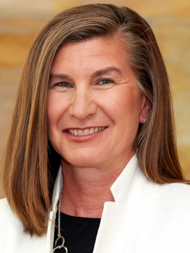The University of New Mexico Comprehensive Cancer Center’s mission to provide the highest quality cancer care to every New Mexican will get a boost this year with two grants from the American Cancer Society (ACS).
The UNM Comprehensive Cancer Center is the recipient of a $25,000 grant to help cover lodging costs for patients and families and another $10,000 grant to help cover transportation costs.
“This assistance is highly important,” said Jill Schulke, Patient Family Support Services director at the UNM Cancer Center. “It ultimately affects some patients who might not otherwise be successful with treatment if they are constantly stressed with having to find the means to stay here or get here.
“It also provides a sense of security in that they may not have to make so many monetary choices to offset the costs of cancer care. Many of our patients are burdened financially by loss of income during care, when maybe they are unable to work.”
Schulke noted that the money can help patients who are in Albuquerque or from far away but it’s intended to help patients who don’t have a way to pay for either transportation or lodging.
“It’s mainly for those who do not have coverage for either one, but we know they need to get here for treatment,” she said. “And, sometimes that treatment is for six weeks continuously, and it would be too difficult to drive back and forth.”
The UNM Cancer Center is the only National Cancer Institute-accredited comprehensive cancer center within a 500-mile radius and many patients must travel lengthy distances to get there.
The transportation grant will help roughly 300 patients over the year, Schulke said. It’s the third time the Cancer Center has received the grant, but the first time it was awarded $10,000. In the previous two years, the ACS awarded grants of $5,000.
This is the first time the ACS has offered the lodging grant.
Schulke also noted that New Mexico has a high number of socioeconomic disparities that play a factor in patients getting to Albuquerque and getting the care they need.
Disparities predominantly arise from inequities in work, wealth, income, education, housing and overall standard of living, as well as social barriers to high-quality cancer prevention, early detection and treatment services, the ACS said.
The grant program is a part of a collaborative approach to help communities with higher socioeconomic burdens, the ACS said, noting “Even the best treatment can’t work if a patient can’t get there.”
Schulke said the UNM Cancer Center has provided transportation and lodging assistance to patients over the years and the money has been written into the Patient Family Support Services budget.
The ACS grants help to fund that budget, as do in-kind donations and money raised from the annual Lobo Cancer Challenge bicycle race every fall.
All of those funding sources continue to be a part of the Patient Family Support Services Budget and the Lobo Cancer Challenge has even begun taking registration for its 2022 event.
UNM Comprehensive Cancer Center
The University of New Mexico Comprehensive Cancer Center is the Official Cancer Center of New Mexico and the only National Cancer Institute-designated Cancer Center in a 500-mile radius.
Its more than 136 board-certified oncology specialty physicians include cancer surgeons in every specialty (abdominal, thoracic, bone and soft tissue, neurosurgery, genitourinary, gynecology, and head and neck cancers), adult and pediatric hematologists/medical oncologists, gynecologic oncologists, and radiation oncologists. They, along with more than 600 other cancer healthcare professionals (nurses, pharmacists, nutritionists, navigators, psychologists and social workers), provide treatment to 65% of New Mexico’s cancer patients from all across the state and partner with community health systems statewide to provide cancer care closer to home. They treated almost 15,000 patients in more than 100,000 ambulatory clinic visits in addition to in-patient hospitalizations at UNM Hospital.
A total of nearly 1,855 patients participated in cancer clinical trials testing new cancer treatments that include tests of novel cancer prevention strategies and cancer genome sequencing.
The more than 123 cancer research scientists affiliated with the UNMCCC were awarded $38.2 million in federal and private grants and contracts for cancer research projects. Since 2015, they have published nearly 1000 manuscripts, and promoting economic development, they filed 136 new patents and launched 10 new biotechnology start-up companies.
Finally, the physicians, scientists and staff have provided education and training experiences to more than 500 high school, undergraduate, graduate, and postdoctoral fellowship students in cancer research and cancer health care delivery.
